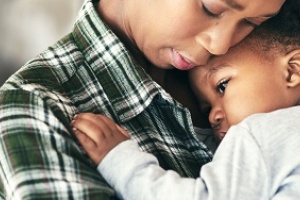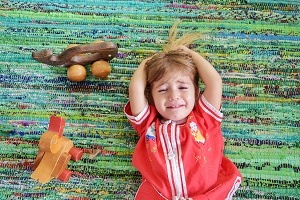How can you decompress, recalibrate, refresh, when you can’t even find the energy to press mute on the TV remote? Just one more round of CBeebies…
Chances are you’ve got pretty long to-do list. You’re a parent after all. But how can ‘buy more broccoli’, ‘book swimming lessons’ and ‘be a good parent’ all be achieved at once? The demands of our fast-paced, teched-up, chaotic world mean stress levels often run high.
You’re not alone if you’re feeling the pressure from ‘perfect parents’ filling your social feeds, pavements and supermarkets. We know what it's like and we’re here to support you.
Parenting can be stressful. So we’ve got practical tips to help you better cope with the demands parenting brings…
First, the bit you won’t want to hear – our stress can trickle down to our kids…
Stress can feed off stress
Not only can babies sense stress but they actually mirror it. One study showed that mothers in stressful situations had heart rate increases and that their babies’ heart rates increased too when reunited with them (Waters et al, 2014). More than that, this increased stress then influenced the infants’ behaviour. These babies were more reluctant to interact with strangers than the no-stress control group (Waters et al, 2014).
Amazingly, from a young age, babies are attuned to the looks on our faces (Bertin and Striano, 2006; Hsu and Jeng, 2008). They also feel our emotions when we hold them (Waters et al, 2017).
We’re not saying you’re going to cause harm by sometimes picking baby up when you’re feeling fretful. But this evidence shows that your self-care should be an important consideration as you ride the high-speed parenting train.
Here are six stress-busting tips:
1. Lean on grandparents
Grandparents are often a strong source of support for many parents. Either providing a physical helping hand, or a much needed emotional sounding board (Skype at the ready for all those long-distance grandparents). Studies show sharing the load with grandparents can have positive stress-busting effects on parents (Thoits, 2011).
2. Get by with a little help from your friends
Social connectedness is important. But this isn’t necessarily just a chinwag with any old friend or neighbour (although of course, this can help). Sharing with other parents going through similar experiences can provide empathy, advice and coping strategies. This camaraderie seems to be particularly effective at stress busting (Thoits, 2011).
Parenting classes, social networks and other sources of support and advice are also important (Thoits, 2011; Barlow et al, 2014).
3. Be confident in your parenting choices
Many women who choose to go back to work suffer stress associated with putting their child in childcare (Parkes et al, 2015). Some evidence shows that there are plenty of benefits for mums returning to work (Kim and Wickrama, 2014). Other studies show an equal weighting of benefits for children of working or stay-at-home mums (Brooks-Gunn et al, 2010). This shows that it’s probably best to do what is right for you and your family. And don’t stress about your choice. There is no wrong answer.
4. Step away from the baby
Taking a little time out is sometimes the only way forwards – don’t be afraid to put an upset baby down somewhere safe and go into the next room for a breather. Short bursts like this won’t cause them harm and can be a necessary break.
“Sometimes I just get so affected by my baby’s cries, I am clearly wired to them. Their distress evokes a clear distress within me too.” Zahara, mum to Ray, seven months
5. Escape from the tiredness trap
We might all sleep in cycles but lack of sleep can breed a vicious cycle of its own. Plus, your baby then senses your emotions making it harder for them to sleep (argggh) (Teti et al, 2010). Research shows that people adapt better to tiredness when they stop calculating hours lost. And stop worrying about tomorrow, instead accepting and making the best of things (Ong et al, 2012).
6. Don’t be afraid to hit the escape button
We’re not suggesting you have the funds, time or even the energy for a full-blown spa break. But don’t feel like you have to dedicate yourself to being there every single second of the day to be a ‘good’ parent. Your partner, mum/dad/in-law, friend or babysitter, can all provide welcome free time for you to recharge and recalibrate.
Being outdoors in nature can reduce tension and diffuse anger (Thompson Coon et al, 2011). And exercise boosts your mood and can even protect the body against the effects of stress (Altchilder and Motta, 1994; Spalding et al, 2004).
“When my daughter started at nursery two days a week, I felt an intense pressure to make every second away from her count. I crammed as much freelance work as I could into every minute we were apart. But then I soon felt I might burn out. Now I’ve learnt to enjoy the novelty of my toddler-free days. Savouring that coffee on the way to work. And even cracking through personal to-do lists on ‘nursery time’. I might even get my hair cut. Rock and roll.” Katy, mum to Nelson, 18 months
So there you have it – feeling more zen? Our articles on positive parenting and mindful parenting are useful reads too.
This page was last reviewed in March 2019.
Further information
Our support line offers practical and emotional support with feeding your baby and general enquiries for parents, members and volunteers: 0300 330 0700.
You might find attending one of NCT's New Baby groups helpful as they give you the opportunity to explore different approaches to important parenting issues with a qualified group leader and other new parents in your area.
Make friends with other parents-to-be and new parents in your local area for support and friendship by seeing what NCT activities are happening nearby.
Barlow J, Smailagic N, Huband N, Roloff V, Bennett C. (2014) Group-based parent training programmes for improving parental psychosocial health. Cochrane Database Syst Rev. (6):CD002020. Available from: https://www.cochranelibrary.com/cdsr/doi/10.1002/14651858.CD002020.pub4/full [Accessed 19th March 2019]
Bertin E, Striano T. (2006) The still-face response in newborn, 1.5 and 3-month-old infants. Infant Behav Dev. 29(2):294-297. Available from: https://www.ncbi.nlm.nih.gov/pubmed/17138285 [Accessed 19th March 2019]
Brooks-Gunn J, Han WJ, Waldfogel J. (2010) First-year maternal employment and child development in the first seven years. Monogr Soc Res Child Dev. 75(2):7-9. Available from: https://www.ncbi.nlm.nih.gov/pubmed/25152543 [Accessed 19th March 2019]
Hsu HC, Jeng SF. (2008) Two-month-olds' attention and affective response to maternal still face: a comparison between term and preterm infants in Taiwan. Infant Behav Dev. 31(2):194-206. Available from: https://www.ncbi.nlm.nih.gov/pubmed/18035422 [Accessed 19th March 2019]
Kim J, Wickrama KAS. (2014) Mothers’ working status and infant development mediational processes. Journal of Family Issues. 35(11):1473-1496. Available from: https://journals.sagepub.com/doi/abs/10.1177/0192513X13496414?journalCo… [Accessed 19th March 2019]
Ong JC, Ulmer CS, Manber R. (2012) Improving sleep with mindfulness and acceptance: a metacognitive model of insomnia. Behav Res Ther. 50(11):651-660. Available from: https://www.ncbi.nlm.nih.gov/pmc/articles/PMC3466342/ [Accessed 19th March 2019]
Parkes A, Sweeting H, Wight D. (2015) Parenting stress and parent support among mothers with high and low education. J Fam Psychol. 29(6):907-918. Available from: https://www.ncbi.nlm.nih.gov/pmc/articles/PMC4671474/ [Accessed 19th March 2019]
Teti DM, Kim BR, Mayer G, Countermine M. (2010) Maternal emotional availability at bedtime predicts infant sleep quality. J Fam Psychol. 24(3):307-315. Available from: https://www.ncbi.nlm.nih.gov/pubmed/20545404 [Accessed 19th March 2019]
Thoits PA. (2011) Mechanisms linking social ties and support to physical and mental health. Journal of Health and Social Behavior, 52(2), 145–161. Available from: https://www.ncbi.nlm.nih.gov/pmc/articles/PMC4671474/#c51 [Accessed 19th March 2019]
Thompson Coon J, Boddy K, Stein K, Whear R, Barton J, Depledge MH. (2011) Does participating in physical activity in outdoor natural environments have a greater effect on physical and mental wellbeing than physical activity indoors? A systematic review. Environ Sci Technol. 45(5):1761-1772. Available from: https://www.ncbi.nlm.nih.gov/pubmed/21291246 [Accessed 19th March 2019]
Waters SF, West TV, Mendes WB. (2014) Stress contagion: physiological covariation between mothers and infants. Psychol Sci. 25(4):934-942. Available from: https://www.ncbi.nlm.nih.gov/pmc/articles/PMC4073671/ [Accessed 19th March 2019]








